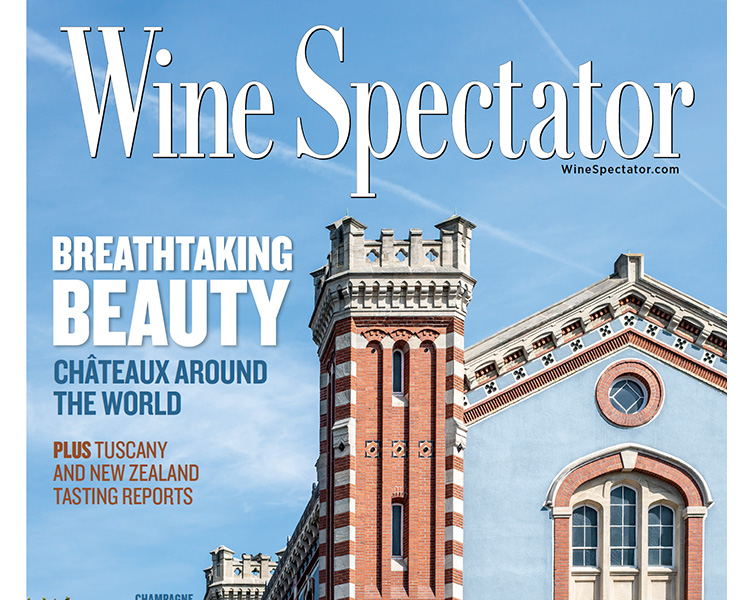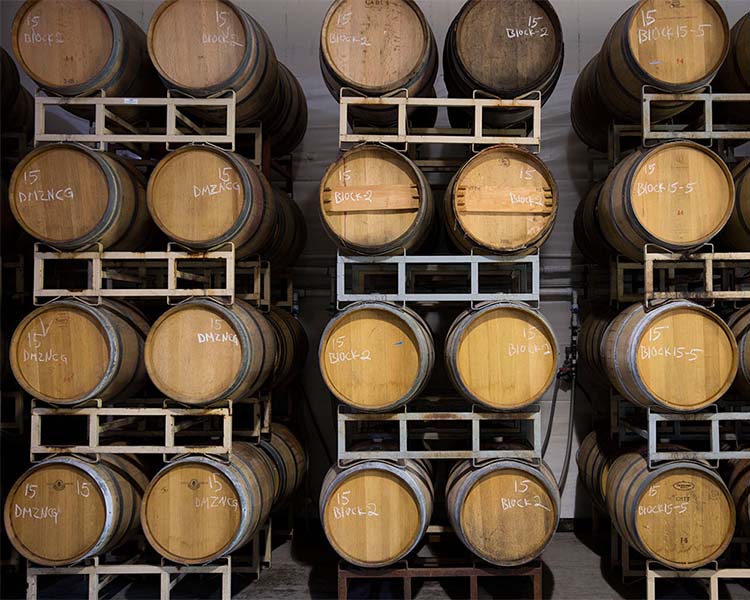Family-Owned Wineries of the Russian River Valley
The Limerick Lane Estate sits in the extreme north east corner of the Russian River appellation. Nestled at the foot of rolling hills above the valley floor, the property is home to 53 acres of vineyard, much of it dating back to 1910, and our small estate winery. The winery and land have been family owned and operated for over a century. The imprint of the families that have owned and tended these vines is undeniable and the wines we produce are not only reflections of our past but tributes to the people who steadfastly lived amongst and tended our historic vines for decades on end.
Much of the wine world has been consolidated under corporate umbrellas over the last few decades, but like Limerick Lane, there are holdouts. Acorn, Bacigalupi, Carlisle, and Holdredge are family-owned compatriots here in the Russian River appellation, all dedicated to honoring the history and terroir of this singular valley. Here are some of our favorite family-owned wineries in the Russian River Valley.
ACORN Winery
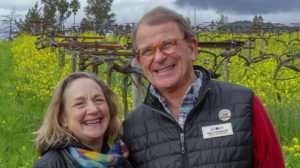
Our friends & neighbors Bill and Betsy Nachbaur purchased the 32 acres that became ACORN Winery/Alegría Vineyards in 1990. They revived the original 1890 Zinfandel field-blended vineyard, and planted the adjacent acreage as field blends as well. Bill and Betsy are passionate, hands-on vignerons (wine growers). They live on the property, and like us here at Limerick Lane, they are vineyard- and vintage-driven winemakers.
At ACORN, all blends are co-fermented and sourced from their own hand-farmed, certified sustainable vineyards. Passionate advocates of food-friendly wines, Bill and Betsy host casual but informative tastings that are seated, private, and often outdoors. Try their Alvarinho, Grüner Veltliner, Cabernet Franc, Sangiovese, Dolcetto, Syrah, Zinfandel, and Rosato. Tastings are by appointment only. Appointments can be made through their website: www.acornwinery.com
Children, dogs, and picnics are welcome!
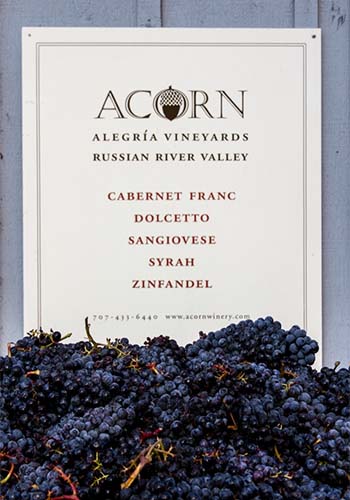
Bacigalupi Vineyards
Charles and Helen Bacigalupi moved to the small town of Healdsburg after graduating from school in San Francisco in the early 1950s. Charles worked as the local dentist and Helen as a pharmacist, all the while dreaming of owning a vineyard. In 1956, the couple moved onto Westside Rd and purchased 121 acres, which included 16 acres of existing Zinfandel, Mission, Golden Chalice, and Muscat grapes. Through his dentistry practice, Charles had become friends with California wine industry pioneer Paul Heck, who’d worked for the Italian Swiss Colony before buying Korbel Champagne Cellars in 1954.
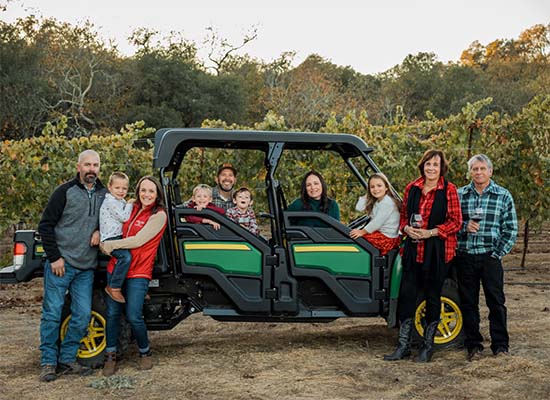
The two would occasionally chat about grapes and wine, sharing insight and advice. Paul had obtained Pinot Noir bud wood from Karl Wente, the first well-documented plantings of Pinot Noir in the Russian River Valley. The stock had come from France via the Wente family’s old vineyard in Livermore. Envisioning greater demand for premium wine grapes, Paul encouraged Charles to plant Chardonnay and Pinot Noir as well, and in 1964, Charles planted six acres to each varietal.
The Bacigalupi family gained recognition as growers during the famous 1976 “Judgment of Paris” tasting. Chateau Montelena’s 1973 Napa Valley Chardonnay, declared the undisputed winner, had been made from Bacigalupi fruit. This wholly unexpected triumph over many acclaimed French wines became the turning point in America’s global wine image. The block of Chardonnay used to produce this world-renowned wine is still in existence today.
With nearly 60 years of experience in the grape growing and wine industry, the family is also known for sourcing fruit to some of Sonoma and Napa Counties’ most sought-after names. With three generations now involved, and winemaker Ashley Hertzberg leading the winemaking endeavor, the family showcases wines under their own label at their tasting room on Westside Road just outside Healdsburg. For more information visit bacigalupivineyards.com or call 707-473-0115.
Carlisle Winery & Vineyards
When Mike Officer was 19 his older sister gave him a small glass of late-harvest Riesling. “Ambrosia!” he exclaimed. He was hooked. He began collecting wine in college, attended numerous wine tastings, even taught a course on wine appreciation.
The real world intervened and Mike settled into a career in software development. Three years in, he yearned to spend more time pursuing his real passion, and began with five gallons of Zinfandel in his kitchen.
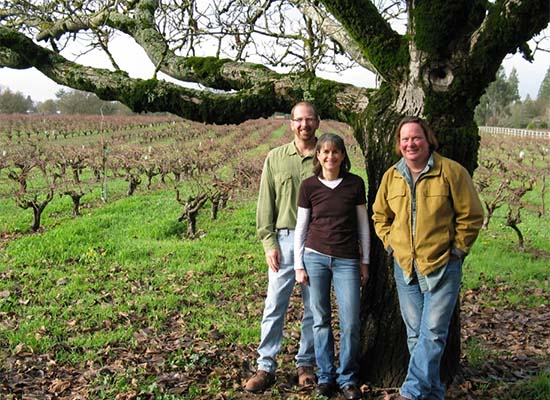
Over the next several years, with the help of friends and his wife, Kendall Carlisle, he made a barrel of Zinfandel each vintage. The results were encouraging, so he and Kendall moved to Sonoma County, where he found himself drawn to the old-vine vineyards–there was something special, even magical, about those ancient, twisted vines with their deep roots and long histories. By 1997 Mike and Kendall were producing over 300 cases of “garage” wine, mostly vineyard designated old-vine Zinfandels, and winning numerous gold medals in amateur competitions. Using meager savings and family support, they launched Carlisle Winery & Vineyards in 1998, concentrating on their two loves: old-vine Zinfandel and red Rhône varieties (Syrah, Grenache, Mourvèdre, and Petite Sirah).
The goal was simple but ambitious: to create small lots of distinctive, world-class wines from some of California’s most exceptional vineyards. With the belief that great wine begins in the vineyard, we sought out Zinfandel grapes from some of the finest vineyards in the county, planted between 1888 and 1934, including our own vineyard planted in 1927 by Alcide Pelletti. For their Rhône varieties, Mike and Kendall contracted with small, family growers, just as dedicated and passionate about growing grapes as they are about making exceptional wine. Mike’s friend Jay Maddox joined Carlisle in February 2001, fresh from an honors degree in viticulture and enology from UC Davis. Together, they have grown Carlisle Winery & Vineyards to nearly 10,000 cases, garnering high praise from wine critics and consumers alike.
Holdredge Wines
“Handcrafted” and “natural” are loosely, often over-used terms within the wine industry, but they accurately describe John and Carri Holdredge’s winegrowing and winemaking methods. Their approach to their flagship varietal, Pinot Noir, is traditional–they believe Pinot is grown and not made–and they began using “minimal intervention” winemaking techniques before it became a buzzword. A small family winery in the truest sense, Holdredge makes fewer than 2,000 cases of Pinot Noir from the Russian River and Sonoma Coast appellations each year, along with a second label, “Oscuro,” devoted to lesser-known grape varieties of Italy.
The old red barn that serves as the Holdredge winery has a colorful history. In the late 1800s it served as a winery owned by the French-American Tartar Works.
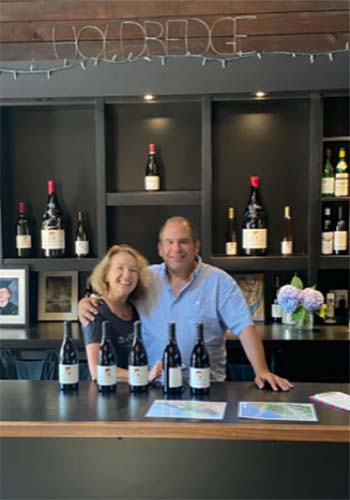
At the time, cream of tartar (potassium bitartrate–a natural byproduct of winemaking) was in greater demand due to lack of refrigeration. The Tartar Works was run by Georges de la Tour, who left for Napa in1900. There he purchased four acres in Rutherford which became the foundation for the iconic Beaulieu Vineyard…their flagship Cabernet is still named after him. The Tartar Works property then became home to the Scatena Brothers Wine Company, which later moved to Grove Street and was ultimately purchased by the Seghesio family. During Prohibition the building became a fruit packing house/cannery, and after Prohibition, reverted to wine production.
The Holdredges haven’t changed things a whole lot. The old-growth Douglas fir still graces the interior walls, and history literally comes alive in their secondary fermentations, which take place naturally due to a unique strain of lactic acid bacteria still living in the barn, an apparent ghost of past operations. Holdredge was an under-the-radar winery with a cult following for many years, but the secret is out. Tasting by appointment only.
